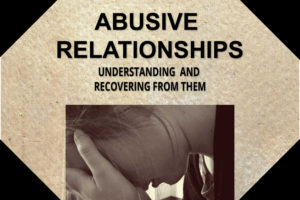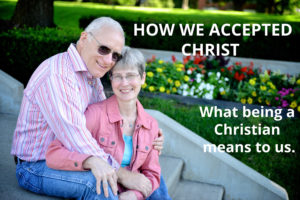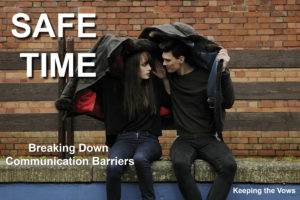Abusive Relationships: Understanding and Recovering From Them

Q&A: Abusive Relationships: Understanding and Recovering From Them
Here’s a question we received:
As someone who has survived an abusive relationship prior to my marriage with the love of my life, my heart goes out to all people out there who are in relationships plagued by abuse. It is so easy to spot an abusive relationship after you have been in one yourself, but it is so difficult to self-diagnose in many cases, especially if you have not been in one before. They tend to start out as relatively normal, happy relationships and the slow creep of abuse starts with small, seemingly forgivable abuses that disguise themselves as controlling tendencies. Over time those small abuses pile up until one day you realize one or both of you are abusers. What hope do people in these types of relationships have, when one of the parties is the clear abuser and the victim is afraid to broach the topic with the abuser for fear of retaliation instead of them trying to understand how the victim is feeling? What is the best course of action for these victims of physical and mental abuse? – J. M.
These are two great questions and I will do my best to answer them. In the short time I have here I’ll try to establish some general truths about abuse.
Abuse is Not Your Fault
Getting hit, sexually assaulted, or verbally abused is not your fault. Abuse can come in many forms, but it is always wrong. The abuser will often try to make you believe you asked for it or deserved it, but that’s never the case. This is just their way of trying to rationalize what they are doing. No one deserves to be abused.
Hurting People Hurt People
An abuser is a hurting person. The abused person may see the abuser as strong, but actually, they are weak. A strong person will respect another person. If an abuser felt good about themselves they wouldn’t abuse others. It is not unusual that an abuser feels so inadequate that they will feel the need to tear down those around them. Also, abuse can be a learned trait. If I was abused, it may be in me to abuse others.
Question 1:
What hope do people in these types of relationships have, when one of the parties is the clear abuser and the victim is afraid to broach the topic with the abuser for fear of retaliation instead of them trying to understand how the victim is feeling?
If your spouse will get counseling:
See a qualified Christian counselor. Non-Christian counselors don’t know how to apply Godly principles with their counseling and are, therefore, unequipped. One of my counseling professors would get a call from a secular counselor from time to time referring people to him. He would say, “These people need God talk.” I applaud him for at least recognizing it. A qualified Christian counselor should be able to unlock the cause of the abuse and also teach about forgiveness. Forgiveness doesn’t set your abuser free, but rather you, the abused. Forgiveness is the hallmark of a Christian. I can’t even begin to address this whole forgiveness topic here.
If your spouse won’t get counseling:
This happens a lot. “There’s nothing wrong with me. You’re the one with a problem. You can get counseling. ” I’ve heard that a lot. If your spouse won’t get counseling, it doesn’t mean you have to live with the abuse. Let’s look at three sources of abuse.
Physical abuse:
No one should live in a marriage with physical abuse. I hear people say the only justifiable reason for divorce is adultery. I can’t recommend someone stay in a relationship where their wellbeing is threatened.
Emotional abuse:
This is every bit as painful as physical abuse… maybe more. Constantly having your self-worth attacked by the one who promised God (and you) to love and cherish you is unacceptable. If the person won’t get counseling and it won’t stop, what is the Christian spouse to do? Read on.
Sexual abuse
- Sex outside the marriage
In this day and age with the STD’s that exist, unfaithfulness can be a death sentence. This isn’t even taking into consideration the hurt of unfaithfulness.
- Sexual abuse in the marriage
It is not uncommon for a person to not give love or emotional support, yet expect sex. A man is visual and a woman is relational. A woman needs a reason to have sex. A man needs a place… and barely a place. It is within a woman’s needs to be loved and made to feel accepted for who she is if she is to surrender her body. Her body is precious to her. Men often don’t understand this.
- Sexual abuse before the marriage
I always counsel people getting married to share with their fiance if they have been raped or sexually abused. They need to let their fiance know and they need to get good Christian counseling. If they don’t shed the hurt from their sexual abuse, it can lead to them not wanting to have sex with their spouse. It can make them feel guilty or unclean. Sex wasn’t created in a dark alley behind a bar. It was created by a loving God as a source of expression of His love, our love, and a source of recreational enjoyment for both spouses. The person who was abused has to be freed from the guilt and be able to enjoy and even initiate sex with their spouse. I have had success in a three-session forgiveness exercise to help the person to forgive.
Question 2
What is the best course of action for these victims of physical and mental abuse?
Of course, the ideal situation would be that the two of you could get good Christian counseling and get the abuse issue resolved. I believe I have partially answered this second question in talking about the first question, but now I’m going to tackle what many of you may be wondering about but were afraid to ask. What if the abuser won’t go to a counselor and/or won’t stop the abuse?
What About Divorce?
Many Christians are afraid to divorce except because of sexual infidelity. That’s understandable, but you shouldn’t have to fear for your life or live with emotional abuse the rest of your life. I’ve never said to a client, “I think you should divorce this person.” But listen to what I have said:
Trial separation
If a person is being unfaithful or any of these other abuses we’ve discussed, I will suggest a trial separation. Sometimes this is a call to attention for the abuser. Sometimes they get the help they need. In all honesty, I don’t see them get the help they need all that often. Very often the abused is an enabler and they throw down a gauntlet, but when the abuser doesn’t respond or stay with the ultimatum, they crumble and the situation goes back to the way it was before. In this case, the enabler is part of the problem and needs counseling help.
If during the separation the abuser refuses to change, then the abused should get counseling and start thinking about the rest of their lives. It is pretty common that after an extended period of separation, the abuser will file for divorce. That is their privilege to do so.
What if they won’t reconcile and won’t file for divorce? This is what we call a sticky wicket. It means there is no quick fix. It is easy to say the only reason for divorce is marital unfaithfulness – and that is it. But what do we do with the woman that fears for her life? What about the woman who is being constantly emotionally tortured? This is what one of my professors told me: in these cases he tells the person, “I know you don’t believe in divorce for trivial matters. Neither do I. In this case, you might file for divorce and tell your spouse, ‘I don’t believe in divorce, but because of the choices you have made and the choices you continue to make, based on your decisions, you have left me no choice but to file for divorce.’”
I know this won’t be popular with some. I’ve thought about it and believe it is a reasonable alternative to a person who refuses to reason.




